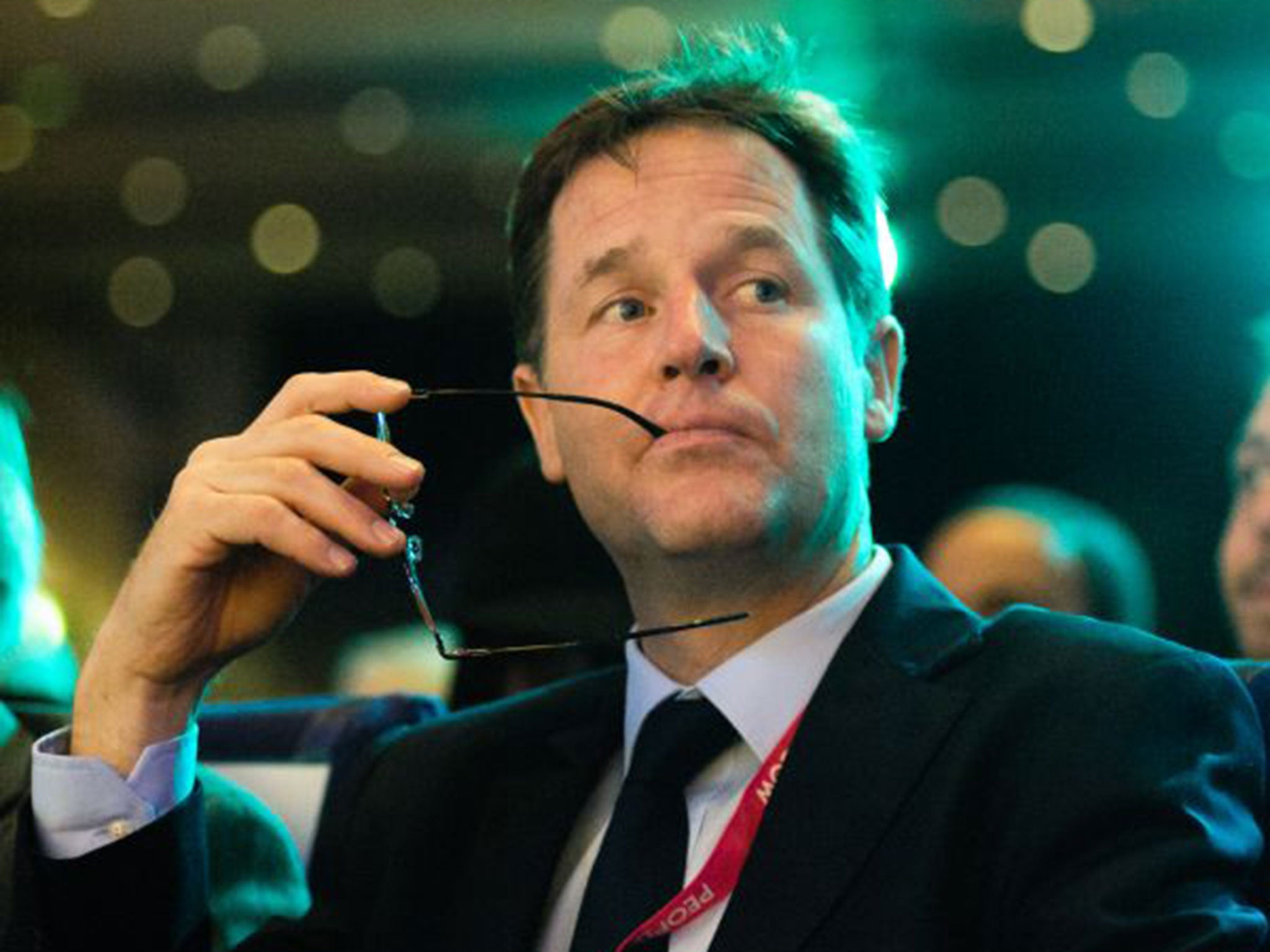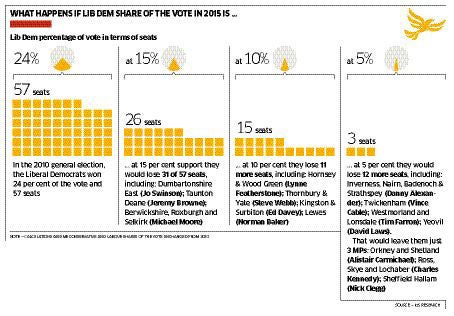Lib Dem conference: Nick Clegg tells party they are in for 'fight of our lives' as conference begins
Members try to rally support as they count the cost of being associated with Tory austerity

Your support helps us to tell the story
From reproductive rights to climate change to Big Tech, The Independent is on the ground when the story is developing. Whether it's investigating the financials of Elon Musk's pro-Trump PAC or producing our latest documentary, 'The A Word', which shines a light on the American women fighting for reproductive rights, we know how important it is to parse out the facts from the messaging.
At such a critical moment in US history, we need reporters on the ground. Your donation allows us to keep sending journalists to speak to both sides of the story.
The Independent is trusted by Americans across the entire political spectrum. And unlike many other quality news outlets, we choose not to lock Americans out of our reporting and analysis with paywalls. We believe quality journalism should be available to everyone, paid for by those who can afford it.
Your support makes all the difference.Nick Clegg warned Liberal Democrats yesterday they were in for the "fight of our lives" as he opened his party's conference in Glasgow.
Acknowledging publicly for the first time that his party faces electoral oblivion next May, the Deputy Prime Minister said the Lib Dems were the "underdogs" but the only party that had the "values, the beliefs and the resilience to win".
Taking a swipe at his coalition partner David Cameron, Mr Clegg described the Prime Minister as a "poor man's Margaret Thatcher and a rich man's Nigel Farage" – forced to pander to the "ugly nationalism" of Ukip and the Tory right wing.
Senior Lib Dems are using the conference to distance themselves from their coalition partners; the party has lost much of its 2010 support after being blamed for spending cuts and other austerity measures. YouGov had Lib Dem support at only 6 per cent last week, down from 23 per cent of the vote at the last general election.
Polling analysis shows the party would lose 31 seats if it slipped to 15 per cent in May's election. However, all of the MPs who contributed to the 2004 Orange Book, including Business Secretary Vince Cable and schools minister David Laws, and who are credited with steering the party to the political centre would survive.
Mr Clegg, also an Orange Booker, painted a grim picture of Britain in 2020, after five years of a Tory majority government. He claimed the country would be "diminished and divided after a botched attempt to renegotiate our relationship with Europe and a vote to withdraw from the European Union".
He added: "Companies pulling out of the UK left, right and centre, the markets losing confidence, hiking up our borrowing costs and halting the recovery in its tracks. Workers fearing for their jobs, not just because the companies they work for are plunged into uncertainty but because their bosses can fire them at will, no questions asked."
Other senior Liberals to open rifts with the Conservatives this weekend included Home Office minister Norman Baker, who accused senior Tories of "suppressing" two reports into plans to tackle drug addiction and legal highs. Simon Hughes, the justice minister, criticised his boss, Chris Grayling, for banning prisoners from receiving books.
Danny Alexander, the Chief Secretary to the Treasury, says in an interview with The Independent on Sunday today that the Conservatives were "diverging away from what we've done in nearly five years of coalition government". He described Mr Cameron's announcement last week he would ape the Lib Dem's policy of raising the tax-free income allowance to £12,500 as "grand larceny".
"A big difference between the parties has become clear over the last wee while and that's about fairness. The Conservatives may claim that they want to help people on low and middle incomes, but the truth is that the only way that they've put forward on how they're going to pay for this [income tax policy] is by cutting money that goes to working age people on low incomes and the working poor – tax credits and that sort of thing," he said.

Mr Alexander will tell the conference today that a Lib Dem government would increase tax-free income by £500 to £11,000 in its first budget before reaching £12,500. This will be partly paid for by tackling tax avoidance. The Treasury's affluence unit, which helps to tackle evasion, has recouped £340m since 2011. Among sports professionals alone this has secured £20m, with another £30m currently under investigation. The unit worked with HM Revenue & Customs to recover £50m from an oil and gas project.
Mr Alexander will say in his speech today: "We are now insisting tax dodgers pay the right tax up front. They will only get any money if their scheme is later proved in the courts to work. Your behaviour is unacceptable, and we are coming for our money."
From December, multinational companies will face restrictions on lending money across borders to minimise tax as occurred in high-profile cases involving major companies such as Starbucks and Google, he will add. "This could yield hundreds of millions of pounds, and it will put Britain in the lead with the first of many steps to implement the new global tax rules."
Mr Alexander is considered a strong contender to succeed Mr Clegg should he resign in the wake of a poor election next year. His major rival is expected to be Tim Farron, the party president. Mr Farron's supporters believe he would be the ideal candidate should the parliamentary party be reduced to about 35 or fewer seats. They consider him a strong campaigner who could re-energise activists in the mould of a "modern-day Paddy Ashdown", who built the party from 22 seats in 1988 to 46 at the 1997 general election.
Mr Farron has been accused of being lightweight on policy issues. He is countering this with a policy motion proposing to create a housing investment bank to tackle the shortage of affordable homes.
Policy focus
"We need to make it clear that we're not in it for our mates, like the Tories. Some of the successes, like shared parental leave, would never have been there with only the Tories."
Gareth Epps; Co-chair, Social Liberal Forum
"A lot of people do know that raising the tax threshold is a Liberal Democrat policy. We just need to keep telling the public that."
Daisy Cooper; Candidate, party president
"The Tories have been seen over the last week for the nasty party that they are. I would go on the offensive to justify our record and ruthlessly exploit those differences over things like the benefit cap and scrapping the Human Rights Act."
Geoff Payne; English Party representative, Federal Policy Committee
"We need to say that issues of social inequality and justice are equal priorities to economics. We must return to a traditional funding of the NHS."
John Pugh; Southport MP, rebelled against leadership on tuition fees
"It does seem that we've been the repository of all the best ideas and that nice Mr Cameron has pinched our income tax policy and Labour the mansion tax policy."
Lorely Burt; Solihull MP, former deputy leadership candidate
"We have got to be very clear where we have stopped the Tories implementing changes that would have been detrimental to the environment."
Baroness Parminter; Former chief executive, Campaign for the Protection of Rural England
Join our commenting forum
Join thought-provoking conversations, follow other Independent readers and see their replies
Comments